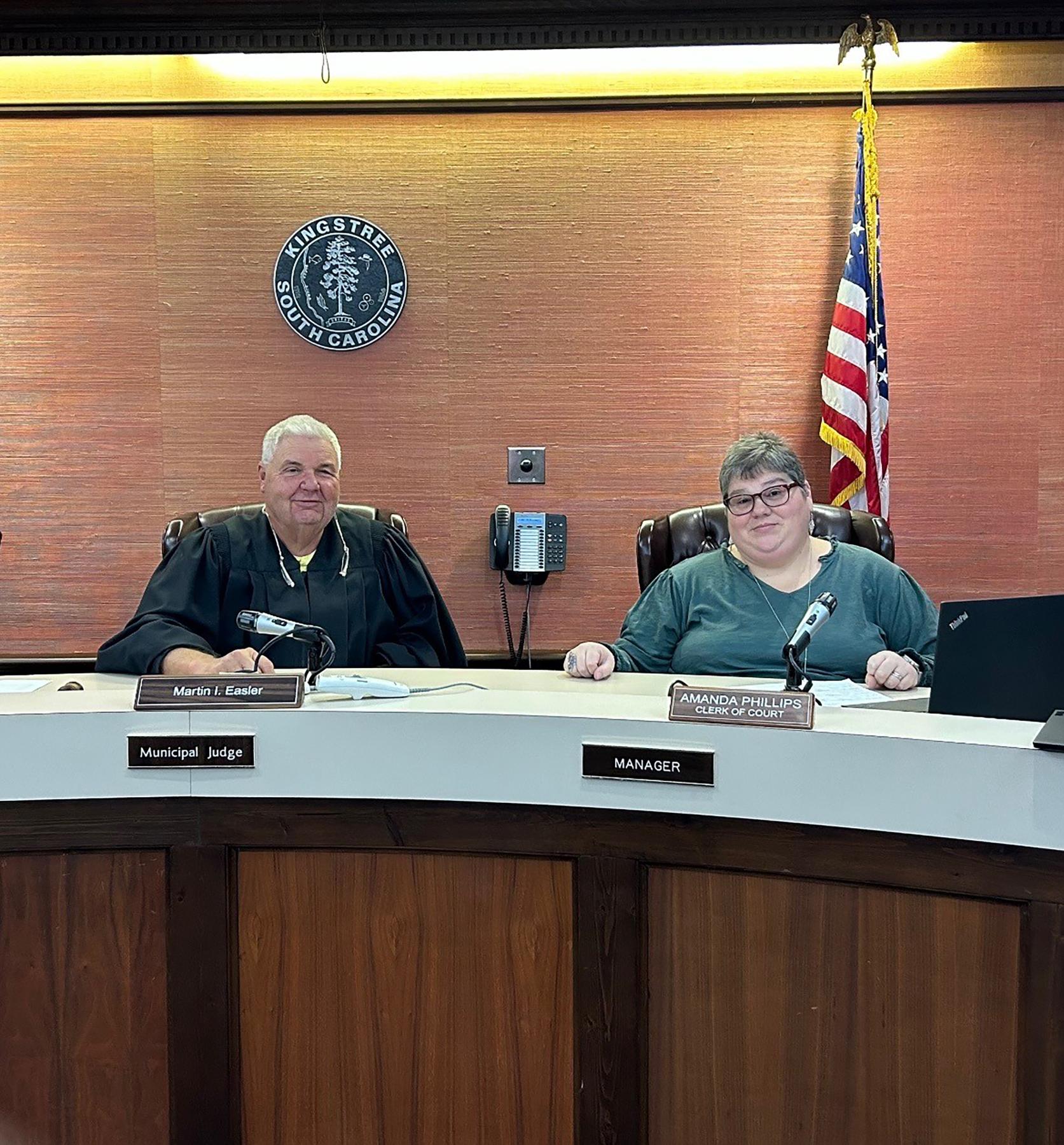Technical knowledge, organizational skills and an ability to work with people and diffuse some tense situations are all necessary to run a clerk of court’s office, whether that is a one-person office or a larger city operation.
And, as Greenville Clerk of Court Pam Larson said, the municipal clerk of court position is something of an anomaly.
“There is no degree for it or credentials for it; however, the responsibility is astounding,” she said.
Municipal clerks of court around South Carolina took myriad routes to arrive at their career, and work to keep up their knowledge of the job and its responsibilities.
“There was not a moment growing up that I dreamed about being a clerk of court. It just happened,” Larson said. “My dream job growing up was to be a Disney artist.”
Larson started her career in the 1990s as a police officer, writing tickets and investigating accidents. Her supervisors noticed she was “administratively inclined,” and she was pulled more into the office. She later left the police department to work for a municipal judge, earning her bachelor’s and master’s degrees while working for the court. She left public service for a couple of years to work for a software firm, and returned as Greenville’s clerk of court when her predecessor retired and suggested she apply.

In Greenville, two clerks of court work together simultaneously. Diana Brock is the clerk of finance, and Larson is the clerk of operations. Splitting the positions has allowed the court to grow and expand equally across both functions, Larson said. “Operationally, I manage the overall business processes and subprocesses including evaluating and re-engineering them for the courthouse and our judicial services office at the detention center. I am responsible for the high-risk liability area of records information management, and ensuring the safety and security of the courthouse and detention center office — not only for our staff but also all of our stakeholders,” she said.
Her duties also include issuing arrest warrants, conducting bond hearings, signing search warrants and swearing in officers, when needed. She is the court’s liaison to the police department.
After years of working in the clerk’s office, she said she understands the importance of training and development, calling it her passion. It’s why she and Kirsten Pressley, municipal court administrator in Greer, developed “Municipal Court Administration Association 101,” a course offered by the Municipal Court Administration Association of SC and designed to provide other municipal clerks of court and court staff with the skills necessary to do their jobs.
Larson said they created the in-depth training program after listening to questions and concerns from other clerks at meetings and conferences, knowing that some clerks were unclear about their responsibilities and regulations.
“For example, having the clerk of court under the police department in the municipality’s hierarchy is a huge violation of the court’s purpose of being a neutral party providing an objective voice of reason in the criminal justice process,” she said. “The court, and especially the clerk of court, is on no one’s team. We are the umpire, the official ensuring the rules and requirements are being followed at all times and treating each party the same.”
Larson understands the importance of keeping up with the law, and said she and Pressley are working on an advanced curriculum for those who have completed MCAA 101. She also teaches a “Know Your Role” session at the Municipal Court Administration Association of SC Annual Meeting.
“When we stop learning as human beings, we become obsolete. When we stop learning as clerks of court, we become vulnerable to letting our court, its staff and the municipality down and also become obsolete,” Larson said.
For Patricia McTeer, the clerk of court in the Town of Hampton, training, organization and people skills help guide her in her job. Her responsibilities include filing legal documents, working with judges and attorneys to assure they have the administrative staff they need to work efficiently, recording court proceedings, creating calendars for cases and preparing and distributing court orders, bench warrants and arrest warrants.
In Hampton, Patricia McTeer serves as clerk of court. Photo: Town of Hampton.

She has been working as a clerk of court for about 10 years, including more than six years as the clerk in Hampton. Before that, she worked in municipal court in Gifford and the magistrate’s office in Hampton County.
“I’ve always been passionate about helping people. I was looking for something challenging and different and rewarding at the same time,” she said.
She found that in the clerk of court’s office.
“No two days will ever be the same. You learn to deal with people, and you try to be considerate. A lot of people are scared because they have never been to court, or they are mad because they’ve never been to court,” McTeer said.
She’s able to make the job work through time management and prioritizing tasks, saying the job can be fast-paced at times. For example, there are days when the phone is ringing, people are waiting at the window to pay a ticket and a judge may be asking for information — all at the same time.
“You have to get used to that,” she said. “Take a deep breath and just move forward.”
She also attends training sessions offered through MCAA, and has served on the group’s board of directors.
“You have to make learning a habit. When I go to a conference, I come back and implement what I learned while I was there,” McTeer said.
She said along with knowing all of the rules and regulations of municipal courts, clerks need to be compassionate. “We need to be firm but fair. You have to be a good listener and be able to deescalate stressed-out defendants.”
“I like helping people,” McTeer said. “People that come in here are looking for help to be guided through his process. They’re afraid when they go to court.
I try to reassure them, saying, ‘It’ll be okay. Let me guide you through this.’” Amanda Phillips, the clerk of court in the Town of Kingstree, had worked for the police department for about 11 years before moving over to the clerk of court’s position when the previous clerk left the job about 12 years ago.

She handles all traffic tickets, takes payments, schedules preliminary hearings and oversees weekly court sessions in town.
“I love interacting with people and being able to help. Of course, everyone’s not happy when they get a ticket, but I have met some people who have taught me wonderful life lessons,” she said. “The job is a lot of dealing with the public. You’re in a customer service field. You have to be able to listen and be mild-tempered.”
Phillips understands the importance of keeping up with new information and taking full advantage of the training sessions available.
“I go through all of the municipal court trainings that I can attend. They are awesome. I’m so thankful that we have it. You’re able to communicate with other clerks there about issues you may be having that they have a suggestion or answer to help you do your job better,” she said.
“The law changes all the time so we are constantly updated with new laws and any type of new procedures. The Municipal Court Administration Association is fantastic about getting all that information in.”
Learn more about the MCAA 101 courses online. Learn more about MCAA, including joining or renewing membership.
